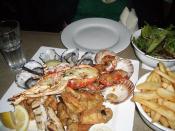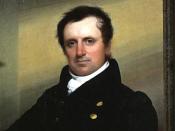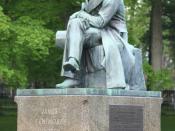James Fenimore Cooper was born on September 15, 1789 in Burlington, New Jersey. He was the son of William and Elizabeth (Fenimore) Cooper, the twelfth of thirteen children (Long, p. 9). Cooper is known as one of the first great American novelists, in many ways because he was the first American writer to gain international followers of his writing. In addition, he was perhaps the first novelist to 'demonstrate...that native materials could inspire significant imaginative writing' (p. 13). In addition his writing, specifically The Deerslayer, present a unique view of the Native American's experiences and situation. Many critics, for example, argue that The Deerslayer presents a moral opinion about what occurred in the lives of the American Indians.
Marius Bewley has said that the book shows moral values throughout the context of it. He says that from the very beginning, this is symbolically made clear. The plot is a platform for the development of moral themes.
The first contact the reader has with people in the book is in the passage in which the two hunters find each other. 'The calls were in different tones, evidently proceeding from two men who had lost their way, and were searching in different directions for their path' (Cooper, p. 5). Bewley states that this meeting is symbolic of losing one's way morally, and then attempting to find it again through different paths. Says Bewley, 'when the two men emerge from the forest into the little clearing we are face to face with... two opposing moral visions of life which are embodied in these two woodsmen' (cited in Long, p. 121).
Critic Donald Davie, however, disagrees. His contention is that the plot is poorly developed. 'It does not hang together; has no internal logic; one incident does not rise out of another' (cited...


